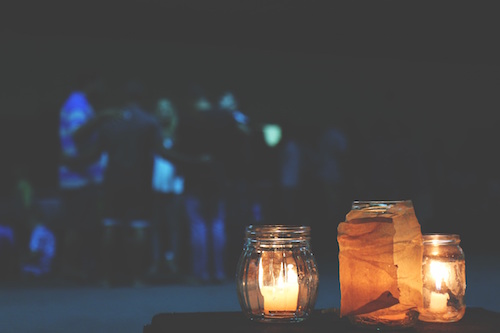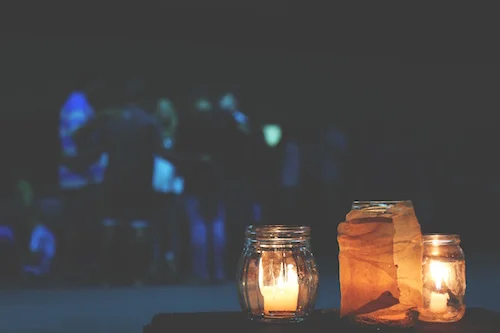Spaces for Hope in the Margins
Hope has fallen on bad times—being hopeful is hard in the best of times and this isn’t the best of times. Blood has been shed, and then shed again as distrust stains hearts and imaginations driving open chasms of prejudice that divide us from one another. The fragile thread of hope can only be stretched so far until it snaps and is lost.
In 2004, Merle Haggard was on his tour bus for a show at the Crazy Horse Saloon in California. “Used to be a wide-open place,” he said of America. “A 24/7 country. You could fly from Bakersfield to Memphis and the whole country would be lit up. Now, it’s dark. No one comes out of their house. Everyone’s scared.”
Now it’s 2016, and from his music I suspect Haggard would think things are darker today. Certainly the world grew darker when we lost him this year, and we are poorer without his voice. Poets are essential if we are not to lose our bearings in a broken finite world.
What I hate is
A statesman speaking out of both sides of his mouth
What I hate is
The war still going on down in the South
What I live for
Is a chance to change a little bit of it all
What I hate is
Most folks don’t seem to care at all
Though Americans are fiercely divided over race and politics and the economy and immigration and so much more, most agree that increasing numbers of people feel increasingly insecure, afraid, and angry. Haggard was right. There are so many reasons: the constant threat of terrorism, cycles of unending warfare in places we can barely locate on a map, racial violence on the streets of our cities, conflicting religious claims, the chaos of failed nation-states, diseases that spread suddenly into epidemics, massive migrations of displaced peoples, an uncertain economic climate, violence by police and against police, technology that encroaches on our humanness, a rapidly changing, increasingly pluralistic culture—the list is remarkable only for being so familiar that it’s no longer remarkable.
Hope is fragile even in the best of times, because in a broken world, no dream is ever fully achieved, and nobody escapes the clutches of disappointment. And that fragility is stretched thin when things move too fast and when even commonplace dreams—a satisfying job, a decent level of stress, a love that will not leave with the morning light, a neighborhood that is free from bloodshed and official violence—seems out of reach for so many. Add to that the deepening dread that perhaps the society I call home is carefully structured to permit injustice, and that distrust festers and explodes because our vaunted level playing field turns out to be anything but level.
But there is a deeper problem with hope today. In an age of disbelief and disenchantment we have become convinced that what is most important—meaning and purpose—can be realized with reference only to the here and now. Science asserts, we are told, that only the cosmos exists, an impersonal expanse of matter and energy, a monistic view of reality that dismisses any sense of the spiritual or the divine as illusionary—or as Richard Dawkins puts it, delusional. Belief in the transcendent and supernatural is assumed unsupportable, and the universe once enchanted by angels and demons, revelation and deeper wisdom from beyond the edge of time, is reduced to mere facts that can be expressed in formulas. In this view it is an act of courage to gaze into the abyss and not shy away from the nothingness, so that in choosing to go forward we find meaning and purpose out of nothing. We go on although there is no rational reason to do so and carve out of nothingness a vague sense of hope—a haunting sense there must be more, though there is not. Philosopher Charles Taylor calls this “exclusive humanism,” and points out that it is an experiment since no society in history has adopted such a belief of stark cosmic loneliness as the basis for human significance. It is an audacious notion as long as we ignore the fact that this vision of reality reduces meaning to nothing more than random synapses firing in an impersonal cosmos. It would be intolerable if we weren’t so distracted.
Of the two, the uncertainty of current events and the erasure of the possibility of a hope that cannot be stopped by death, I am convinced the second, deeper issue is the more crucial. It is the absence of hope and the possibility of its deeper meaning in reality that are the greatest loss and the greater danger. In saying this I am not demeaning terrorism, war, political dysfunction, racial violence, recessions, disease, or any of the other horrors that threaten to wreak havoc. They leave destruction and misery in their wake, destroying neighborhoods, fragmenting families and casting individuals adrift. All such things contribute to human suffering. Still, history is replete with stories of those who have suffered intensely, holding onto hope, believing there was a greater meaning and purpose to their existence and pain. The grand tradition of spirituals is one witness to how hope can flourish even in the face of cruelty.
The tangible threats can cause people to perish; the loss of hope guarantees it. Human beings need a larger narrative to make sense of life. That story places our lives in this moment in history into a wider setting so we can catch a glimpse of our meaning in the vast flow of time and space. It’s actually quite horrible to be lost in the cosmos. Without a hope robust enough to stand against the darkness, the shadows of doubt creep in like the cold fingers of evil reaching for our souls. The death of hope is the death of meaning and the quickest path to despair.
“Where there is no vision,” the ancient biblical proverb says, “the people perish” (Proverbs 29:18, KJV). The word for “vision” in this text refers to something akin to revelation, a sense of what God is doing in the grand narrative of creation, fall, redemption and restoration—the story in which we live and move and have our being. I can have hope not because I’m optimistic (I’m not), or because I ignore the existential threats on my horizon (I try not to), or because I am courageous enough to look into the abyss and not flinch (I live by a different story). I can have hope because the God who called all things into being entered human history, walked into death and back out, and has called me to serve him as the rightful King of all.
If this is true, it means, among many other things, that when God’s people are people of hope we engage in one of the most radical countercultural acts imaginable. Living hopefully means not being depressed or elated over elections since the King remains enthroned regardless of which candidate happens to win. Living hopefully means being grateful for what we have been granted, knowing we do not deserve it when too many have so much less. Living hopefully means taking the risk to talk about race with someone of a different race. Living hopefully is living generously since it is in compassionate relationship that we are most at home. Living hopefully means being creative in our work because excellence and beauty need no justification in God’s world. Living hopefully means carving out evenings to invite a few friends to turn off cell phones, light a few candles, share soup, bread and wine, and hear a short story read aloud. Living hopefully is seeking to bring a small glimmer of light into the dark world Merle Haggard saw, so that the dark isn’t the final word in the corner of reality where we have staked our little homestead. Living hopefully is making and caring for culture in a way that invites people to not merely survive but thrive.
I cannot make my neighbors less fearful, uncertain, or afraid. I cannot change the world or stop the violence. I can, however, in my little place on the margin of life, faithfully seek to live, think, and speak hopefully. Perhaps it will be a spark that will spread more widely and do some good—after all, hope is life-giving, generative. Perhaps not, but that is not my concern. My concern is to make culture faithfully, culture that will encourage people to flourish in this broken world. And being hopeful is culture making because creativity and art and flourishing is impossible without hope.
It is God’s concern as to what He will do with my faithfulness. Perhaps it will be the spark needed by one person to pull back from the edge of the abyss and come to believe that reality is far more enchanted than they ever imagined. The worst that can happen is that I do it before the final audience of one, the King to whom I have sworn allegiance. That’s called a command performance, and for the likes of me, it is sufficient.

Photograph by Jovi Waqa


















